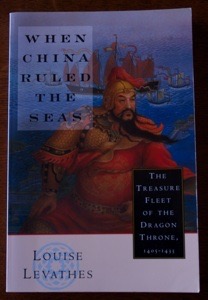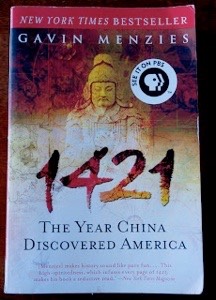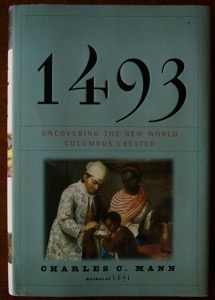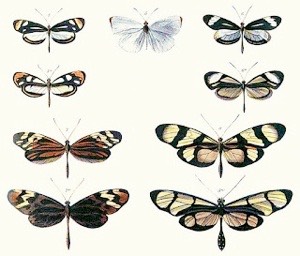The following entries are a few book reviews published on May 13, 2014 on the www.bobbarnes.us website.
Reviews From the Past

I have finished reading "When China Ruled The Seas" by Louise Leavathes. Her take on the issue of the great Chinese Treasure Fleets is more conservative than that described in 1421 and she dwells on the dynamics of Chinese society to a greater extent. After reading these different interpretations I surmise that the truth lies in the middle with the likelihood that the description in 1421 is more likely to develop a solid base than it is to contract dramatically. It is fairly well documented that the Chinese were traveling to Africa, India, Arabia, and Australia very early -- much earlier than the last of the great Treasure Fleets. That should not be surprising, but to take those early contacts as a diminishment of Columbus, Cook, et. al. is a serious mistake. The question is not who got there first, the question is what happen afterward. In the case of the Chinese, their early contacts in Australia probably went on for centuries and that is significant, their trade with Africa and India was significant, and their probable contacts in the "New World" are significant. All of those accomplishments lead to the spread of Chinese knowledge and technological advancements - things that the Arab and European worlds used as foundations for their achievements in the 15th century to present.

***
I have finished reading Gavin Menzies book entitled "1421 - The Year China Discovered America". The book certainly has its detractors but I suspect that Menzies got much of it right. He seems to overreach at times, draws conclusions which clearly do not follow the evidence, gets the facts wrong at times, and is prone to making assertions (rather than developing evidence) at the most unfortunate times. Given all of that, however, it still seems that the basic premises of the book are most likely correct and the details may not matter that much. His detractors, from a web search, sometimes attack the facts as he presents them but seem to more likely to attack his character - which does seem suspect - and in so doing demonstrate some fundamental weaknesses in their arguments.
***

I have just completed “1493" a new book by Charles Mann. This is a follow-up to his book 1491. The professed purpose of the two books is to bracket the Columbus' trip to North America in 1492. In “1491", Mann discussed what the state of affairs were in the Americas prior to 1492 - finding populous cultures which intensely modified their ecosystems for agriculture. In what is now the east coast of the United States there were sophisticated cultures which had made major modifications to the "forests" of that area for agricultural purposes, for instance. In “1493", Mann sets out to describe the ramifications of the transfer of goods to and from the Americas.
I found the discussions of China interesting. I had long known the socio-political changes created in Europe by the introduction of a few varieties of potato. I had not known that a similar situation developed in China, primarily because of the introduction of the sweet potato and maize. I also found the chapters about the African settlements, infused with the indigenous peoples and escaped slaves, which developed throughout the Americas - but mostly south of what is now the US, to be interesting.
Not as "exciting" a read as 1491, but interesting none-the-less. Discovering major historical events (not mere tidbits of history) of which I was unaware is always very pleasing to me. It gives me a sense that I am still learning.
As for a historical tidbit, my son Jon recently sent me a note about "Y-12", the World War II uranium enrichment facility at Oak Ridge, Tennessee. It seems at start-up there was a significant shortage of copper so the electromagnetic coils were made with 14,700 tons of silver borrowed from the West Point Depository of the US Treasury -- and returned after the war.
***
This review was republished on May 19, 2014.
Henry Walter Bates


I have just finished reading "The Naturalist on the River Amazons" by Bates - as an e-book (free from Amazon.com). On January 15, 2009 (Bob's Birding Blog at The Birding Commons), I wrote about Alfred Russel Wallace -- Bates collected with Wallace in the Amazon before Wallace went off to Malay. All in all, Bates collected in the Amazon for more than seven years, accumulating specimens of more than 14,000 species (more than 8,000 of which had not been previously described). Most of his time there was spent under the most primitive conditions. His biological insights were significant -- his cultural insights, well he was a stereotypical European of the time - convinced that European everything defined the civilized world.
His work with the butterflies of the Amazon (he was primarily an entomologist) led to his description of mimicry (the first description of this concept) and especially what is now known as Batesian mimicry (a palatable species mimicking an unpalatable species). A plate from his 1862 paper, "Contributions to an insect fauna of the Amazon Valley - Heliconidae" is shown here.
For those who read the book, he describes several places which are known known by different names. Namely, Pará is now named Belém and Ega is now named Tefé.
***
The following reviews were first published on The Birding Commons blog in April of 2008.
Stephen Jay Gould’s Imperfection
I have just completed Gould’s collection of essays - “The Richness of Life: The Essential Stephen Jay Gould”. Gould had an incredible mind, an appreciation that his readers were not in the sixth grade of grammar school, and a nice wit. But now I have discovered an error. My, oh my. In the last essay of the book “Hooking Leviathan By Its Past” he posits that the scientific names of species are static (discussion in his case two). One of the greatest pains that I face (that is obviously hyperbolic) is trying to keep pace with the constant changing of genus names in ornithology -- causing me to be unreceptive to the statement. Shades of great loss, I feel like I did when I met Sir Edmund Hillary and found him to be a cordial tall man, not some type of super hero. With his later work in the Himalaya for the Sherpa people he became a super hero, but I knew him only as the “conquerer” of Everest. And now Gould…
More Gould
Last night I was reflecting on some of the general themes in Gould’s essays; science and society, the duality of humankind, American fundamentalism (a breed of anti-intellectualism peculiar to the United States), and the multiple processes of evolution. One of his major themes was the struggle to use scientific thought appropriately and for appropriate matters. The first part of this theme is based on his strong conviction that science is amoral the second part addresses the misuse of science (a question of morality). He deals with the suppression of scientific thought and genocide extensively when exploring this theme.
The suppression of scientific thought is an interesting political phenomenon. (Gould never, to my knowledge, expressly describes it in that manner.) I have always thought of such efforts as extensions of power struggles, fundamentally new thoughts and concepts are often threatening to the power in place and are, therefore, resisted. Those same power structures are, all to often, willing to justify their actions as consistent with their interpretation (however inaccurate - but always self-serving) of some scientific concept. Gould focuses primarily on ideas like “social darwinism” when he discusses the misuse of scientific thought and in the process brought to my attention something I had never really considered, at least in a structured manner. He posits that the change in societies is Lamarckian in nature and not Darwinian. It has always been obvious to me that societal change is not Darwinian. I find the idea that societal change is Lamarckian in nature both intriguing and probable. Lamarck’s concept of evolution was that traits that were developed (not inherited) could be passed between generations. This idea fell prey to Darwin’s description of natural selection as a dominate process in the evolution of biological entities. I find it quite elegant and more than a bit ironic that concepts of natural selection are continually applied (inappropriately) to changes in societies when, in fact, it is the Lamarckian concept (the failed biological premise) which is most appropriately applied. Changes in societies are based on learned concepts and passed from one generation to the next through social processes, these concepts deal mostly with a society’s thoughts about morality. The attempts by power brokers to justify their actions (bigotry, genocide, social engineering in general, economic dominance, etc.) by citing biological science is hypocritical at best (not the worst of their sins). The proper “justification” of their actions lies in the realm of morality, something they must take personal responsibility for -- it is not an inherent weakness of the species.
The second theme he discusses frequently is the mixed record of the human species. Here he distinguishes between capability and use. The human mind is capable of great and honorable achievements, it is also capable of incredibly destructive acts. The mind evolved to its present state over a relatively short biological timeframe. It is not provable, at his point, that their are inherent dispositions toward certain sorts of actions. There are strong assumptions about various concepts (nurturing, for instance) and they are sound in theory (to a point) but we lack the ability to “prove” them one way or the other. (Nurturing is an interesting example. In the human species it is required for survival, that seems apparent. But many pundits then carry the concept further to try to ascribe a different basis for nurturing to the two sexes and to even extend their argument to biological developments of social norms in our pre-history - something which is not provable and not worth the conjecture in the first place.)
The third theme, American protestant fundamentalism, as an anti-intellectual practice, is akin to the first theme above. It is about power and the way some people think the world should be - and damn the facts. In one of his essays he notes that the Catholic Church accepts the concept of evolution and natural selection without much issue and that the Kansasian tendencies of protestant fundamentalism are almost singularly American in practice.
The last major theme that I focused on in Gould’s work is the multiplicity of processes which are at work in the evolutionary process. (As a side note, Gould stresses time and time again that the evolutionary process is not directed toward advancement, it is a process of adaptation to a current environment.) Natural selection is the premier biological process at work but there are others. For instance, there are constant random changes to DNA which have no inherent positive or negative affect -- they just happen and they are there. At some point in the far future they may become positive or negative, but at the point of development they are neither. There are also non-biological events which change the evolutionary stream of many species. An asteroid hitting the earth, for instance, led to the demise of the largest reptiles. A chemical spill in a stream can whip out an entire species. There are many examples of events which dramatically change the environment in either an immediate or relatively short time frame (globally warming is receiving a lot of attention at the moment). The adaptations which biological entities may have developed may or may not be able to cope with these dramatic environmental changes.
Gould’s endorsement of concepts like random neutral changes to DNA and the role of chance events enhanced the understanding of evolutionary change. He is most known for his concept of punctuated equilibrium, however. This concept posits that the evolutionary process moves along in its slow but sure manner for millions of years but periodically (in geologic terms) there will be a period of significant change. This fluctuation in the rate of change is well established in the fossil record and may or may not be associated with dramatic events like asteroid strikes or longer term changes like the diminishment of the continental shelve area on the earth as continents drifted together. He was a significant force in the biological sciences and a strong advocate for basic decency in human dealings. His death is a significant loss to humankind.
Google.pedia
Jon gave me a book my Michael Miller, “Google.pedia The Ultimate Google Resource”, for my birthday and I have been reading it in an unstructured manner. Today I read a chapter about the Google Scholar program - a Google search engine for more scholarly research on the web (it has the advantage of citing material which is not on the web as well as that which is). The Google Scholar portal contains the familiar “stand on the shoulders of giants” phrase. I was reminded, in a backward sort of way (by a Gould essay), that “survival of the fittest”, a phrase which is inherently associated with Darwin, did not originate with Darwin. Instead, it is a phrase from Spencer - coined a decade before the publication of the “Origin of Species”. It is often misunderstood to refer to a battle to the end. Darwin accepted the phrase as a descriptor for natural selection after Spencer and others used it widely to describe the Darwinian process. However, Darwin always described natural selection in terms of “survival of the best fit”, evolution is about adaptation.
There was work similar to Darwin’s going on at about the same time that he was developing his description of natural selection: Lamarck was trying to address the same question that Darwin was researching but came up with the wrong answer; work in geology, paleontology, and genetics were also ongoing. Bits and pieces of all of these efforts were known to Darwin and helped, in the very least, to predispose him to his successful description of the evolutionary process. It is, I believe, like this in all fields - I don’t know of any discovery which was made from whole cloth, which was totally original. We all stand on the shoulders of those who came before us.